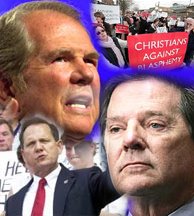 Time magazine author Andrew Sullivan recently outlines the distinction between Christians and 'Christianists' in his article, "My Problem with Christianism". The distinction is similar to the difference between Muslims and Islamic fundamentalists, or 'Islamists' as some call them.
Time magazine author Andrew Sullivan recently outlines the distinction between Christians and 'Christianists' in his article, "My Problem with Christianism". The distinction is similar to the difference between Muslims and Islamic fundamentalists, or 'Islamists' as some call them.LINK HERE (note: this article has since been changed to require subscription to the site, which it didn't at the time of posting. Sorry!)
Along a similar theme, Michelle Goldberg is interviewed on her new book Kingdom Coming: The Rise of Christian Nationalism by the NPR. In this 40 minute audio program, she goes into detail about the political objectives of the Christianists.
LINK HERE
I think it would be helpful to start distinguishing between radical Christianists and Christians, if for no other reason than the fact that more reasonable moderate Christian voices are being lost in the mix.

Hey, just wanted to let you know I'm still reading; just getting a little behind (busy this month). I'll get caught up on comments eventually. :) Great stuff, btw. As usual. ;)
ReplyDeleteThanks much ŧαŋġуаρρłε! :)
ReplyDeleteAck, gotta pay to read the first article.
ReplyDeleteI have such a huge problem with this idea that the Bible is literally true, I can hardly force myself to read anything by anyone who believes that. It just makes no sense to me (and probably never has) that these stories are anything but just that -- fables, mythology, metaphor, allegory, etc. Sorry, that's just my current two cents on the matter.
Dang! The article didn't require pay at the time I read it and linked to it. I don't subscribe and I was able to read the whole thing. Sorry about that.
ReplyDeleteAnyway, I can't rule out the *possibility* that all sorts of bizarre, supernatural, and other things might exist. But such extraordinary claims require extraordinary evidence, and I don't think the ideological writings of ancient primitive tribes qualify.
That isn't to say that a less literal reading might not reveal a good number of ethical ideals worth considering (and some not). But then again, so does a "Moby Dick". Both are books I'd recommend an educated person familiarize themselves with, as long as they don't credulously take them as necessarily historic events.
Thanks for reading :)